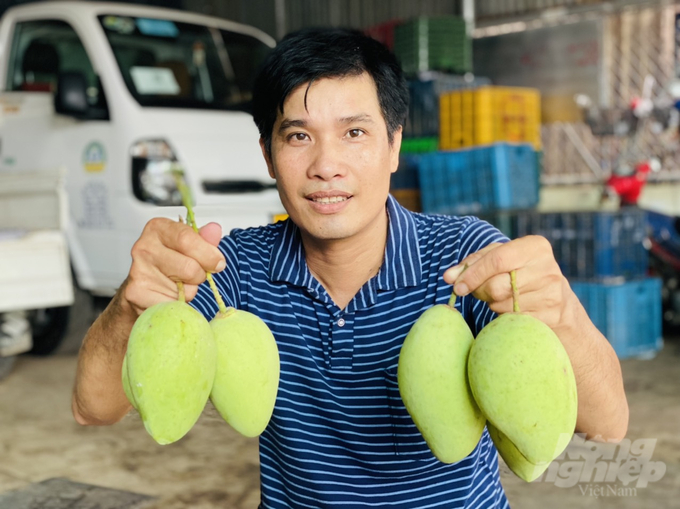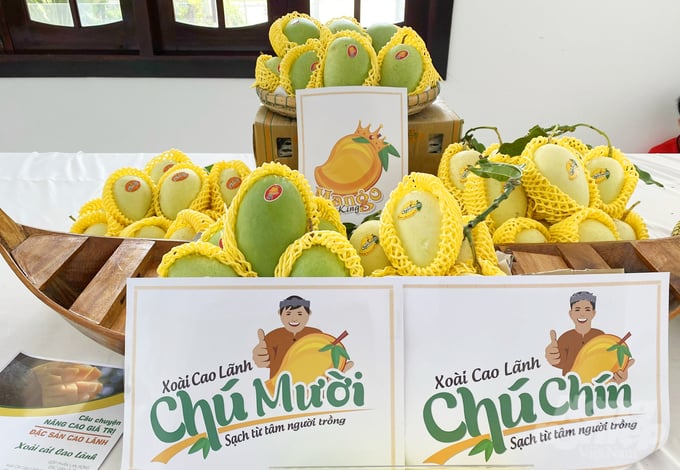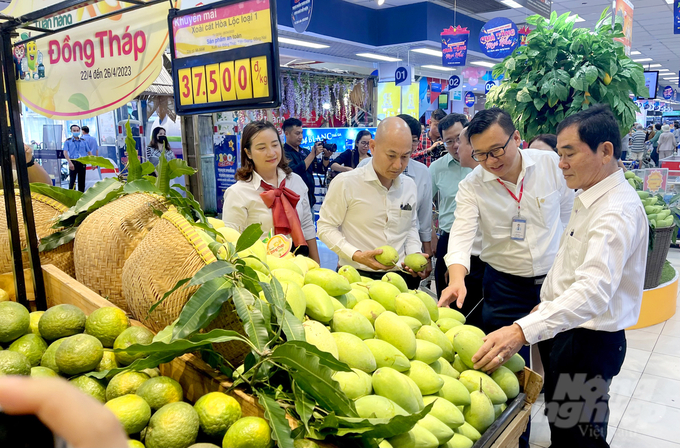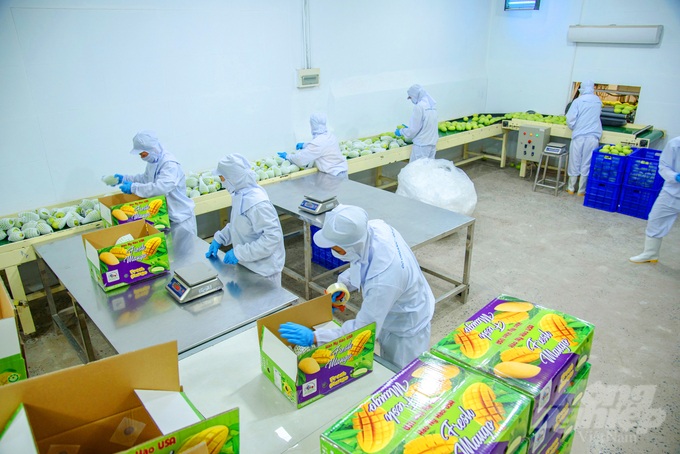June 16, 2025 | 19:13 GMT +7
June 16, 2025 | 19:13 GMT +7
Hotline: 0913.378.918
June 16, 2025 | 19:13 GMT +7
Hotline: 0913.378.918

Currently, Cao Lanh district has over 4,200 out of 14,000 hectares of mango cultivation in Dong Thap province. Photo: Le Hoang Vu.
Mango is characteristic of the alluvial land
Dong Thap province, a fertile land with a diverse ecosystem of the Mekong Delta, has long been famous for its high-quality agricultural products. Among them, Cao Lanh mango, a fruit highly appreciated by consumers both domestically and internationally, has become a distinctive symbol of the province.
To protect and enhance the brand value of Cao Lanh mango, Dong Thap province has implemented various activities aimed at preserving and developing the geographical indication for this special product.
Cao Lanh mango, primarily consisting of Hoa Loc and Chu mango varieties, has been cultivated in Dong Thap for a long time. With nutrient-rich soil from the alluvium of the Tien River and a favorable climate, Cao Lanh mango has excelled in both quality and yield. Notably, its sweet taste, soft flesh, and distinctive aroma create a uniqueness that few mango varieties can match.
Not just an ordinary agricultural product, Cao Lanh mango also carries immense cultural and economic value. The sprawling mango orchards not only provide a stable income for local people but also contribute to promoting the image of the locality on a global scale.
In 2012, Cao Lanh mango officially received its geographical indication, marking an important turning point in affirming the value and quality of this fruit. The geographical indication serves not only as a tool to protect the rights of mango growers but also creates a competitive advantage when the product participates in the international market.

The geographical indication for Cao Lanh mango not only affirms the agricultural product value of Dong Thap but also presents a great opportunity to bring this product to the world. Photo: Le Hoang Vu.
Nguyen Van Vu Minh, Director of the Dong Thap Department of Agriculture and Rural Development, stated: "The geographical indication for Cao Lanh mango not only helps protect the origin and reputation of the product but also serves as an important stepping stone for Dong Thap mango to reach difficult markets such as Europe, the United States, and Japan. To achieve this, Dong Thap's agriculture sector always emphasizes supporting farmers from production to consumption."
Currently, with support from policies at both the central and local levels, the Cao Lanh mango industry has made solid progress in improving its value chain. Activities such as advanced farming technique training, raising awareness about clean production, and building brands have contributed to enhancing product quality and meeting the increasingly stringent demands of both domestic and international markets.
Despite having achieved many successes in preserving and developing the geographical indication, the Cao Lanh mango industry still faces numerous challenges, including climate change, plant diseases, and fierce competition from mango products in other countries, all of which pose risks to the quality and reputation of Cao Lanh mango.
"We will continue to strengthen scientific research, applying modern technology in mango production and processing. At the same time, expanding consumption markets, especially international markets, will be a top priority to enhance the value of Cao Lanh mango," emphasized Nguyen Van Vu Minh.

In 2012, Cao Lanh mango officially received its geographical indication, marking an important turning point in affirming the value and quality of this fruit. Photo: Le Hoang Vu.
Efforts of the local government
Currently, Cao Lanh district has over 4,200 out of 14,000 hectares of mango cultivation in Dong Thap province, where the majority of the province's mango area is concentrated. There have been many positive directions in preserving and developing the geographical indication for this product.
According to Bui Tan Phuoc, Chairman of Cao Lanh District People's Committee, the district recognizes that preserving the geographical indication for Cao Lanh mango is not only about protecting traditional values but also about promoting the sustainable development of the agricultural sector. The district has closely collaborated with cooperatives, businesses, and farmers to develop a mango production plan according to VietGAP and GlobalGAP standards, ensuring that Cao Lanh mango consistently meets the highest quality for export and domestic consumption.
Cao Lanh district has implemented various programs to support mango growers, including providing high-quality mango seeds, offering technical advice on planting and caring for mango trees, and connecting with processing and exporting companies. These policies not only help farmers increase productivity but also stabilize prices, avoiding the " bumper harvest, low prices" situation, which is one of the major challenges facing Dong Thap's agricultural sector.

Mango exports in Dong Thap. Photo: Le Hoang Vu.
The participation of mango cooperatives in Dong Thap province also plays a crucial role in protecting and developing the geographical indication. A notable example is My Xuong Mango Cooperative, which is one of the pioneering units in applying clean cultivation standards and linking product consumption.
Vo Viet Hung, Director of My Xuong Mango Cooperative, stated: "We are always aware of the role of the geographical indication in affirming the Cao Lanh mango brand. The cooperative has established safe mango production processes according to international standards while strengthening ties with major exporting companies to ensure stable outlets for the products. In addition, we actively participate in agricultural fairs and exhibitions to promote the Cao Lanh mango brand to consumers both domestically and internationally."
Translated by Mai Quang Huy
/2025/06/12/3721-2-202745_83.jpg)
(VAN) TH made an impression at Seoul Food 2025 with its line of natural beverages, paving the way for Vietnamese food products to enter the South Korean market.

(VAN) Soc Trang's success in rice exports stems from a strategy of developing fragrant and specialty rice cultivation areas and standardizing production toward low-emission practices.
/2025/06/11/1311-5-120811_839.jpg)
(VAN) The pig farming industry is facing the challenge of comprehensive restructuring to meet requirements for quality, safety, traceability, and market expansion both domestically and for export.

(VAN) Vietnam considers participating in ALGROALBA in order to expand agricultural production, coordinate the assessment and effective exploitation potential land.
/2025/06/05/5314-1-184727_407.jpg)
(VAN) From seemingly worthless fish scales and skin, enzymes and lactic ferments can transform by-products into peptides, opening a sustainable, effective business direction and elevating Vietnamese seafood.

(VAN) TTC AgriS and IFC signed a strategic partnership to develop a sustainable agricultural value chain, aiming to achieve the Net Zero target by 2035.

(VAN) Seafood by-products are opening a new path, combining green growth and technological innovation to enhance the industry's value.